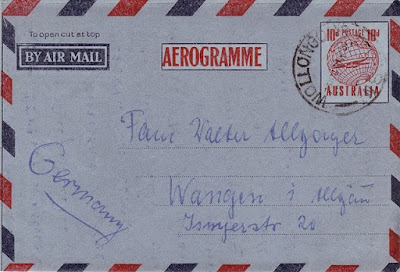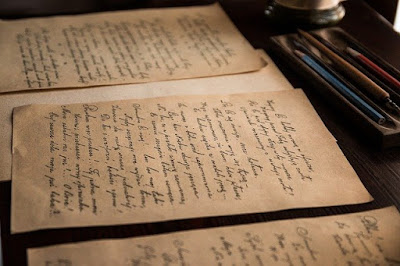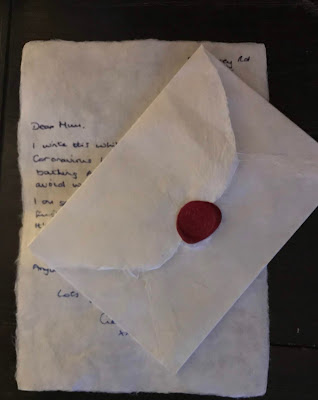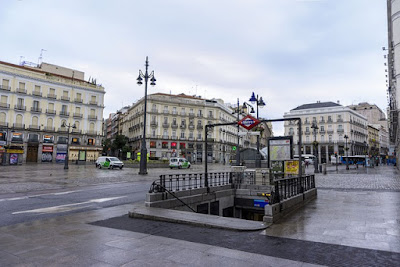'You want me to write you a letter?'
This was uttered in shocked tones by my son, who possibly has not picked up a pen since he left school over a decade ago. His face, on my computer screen by virtue of the internet and some app or other, registered disbelief, and possibly a touch of horror.
It was just a suggestion, clearly dismissed at his end. Why write a letter, on paper, with pen, probably sitting at a table, and forced to slow down? Surely an email or, better still, a text with half a dozen or more emojis, would suffice. No, hold on, there's bound to be a gif to issue the ideal, possibly witty, greeting.
And yet traditional letter writing is an art not so much forgotten, as pushed to the margins of our lives. Perhaps it's because I'm old and grew up in the days when communication came largely via the Post Office and sometimes by telephone. I recall the pleasure of putting time aside on occasional evenings to take out my writing set and settling down to scrawl out, more or less legibly, a few pages of news to friends and family across the globe. It was an oddly relaxing activity: I would settle in my bedroom of an evening or sit at the dining room table while the rest of the family were watching TV, writing pad and envelopes and a set of biros to hand, and then just lose myself in what I wanted to say. For that while, there was a connection in my mind between me and the person to whom I addressed the letter, a sense of pleasure in communicating with them, a feeling of anticipation, of wondering how the person would react to what I had written - would they be interested, would they find my quips witty, would they write back?
Writing a letter by hand means slowing down your thoughts and selecting the right words and phrases so you express yourself clearly, but without overwriting. While emails are limitless, a hand-written letter relies on your having enough paper and sufficient ink to say what you want to say. Except that mostly, if you are writing a casual letter to a friend, you can tailor how much you say to the materials you have to hand. It means that letters can be informative and succinct, and, if you exert enough care and thought, they can be beautiful pieces of writing.
Writing a letter by hand is a sensory experience. These days, there seems to have been a bit of a resurgence, and if you shop around you can equip yourself with gorgeous paper in a whole rainbow of colours, with matching envelopes. You can buy scented ink for an old-fashioned fountain pen, wax and a seal and parchment, and even a quill and nibs if you want to enjoy a seriously quaint writing experience. You can write by candlelight and pretend you're Austen or Dickens, or you can whip out a cheery message in a pretty greetings card in glitter gel ink while waiting for your bus. The feel of physically writing a letter by hand adds to that sense of connection and is deeply satisfying in a way that whipping out an email is not.
I communicate with friends and family mainly using modern technology - WhatsApp mostly, I think, email and video calling, for expediency and because our ridiculously busy lifestyles means that we can spend less time communicating. But I also supplement this with occasional letters. If I enjoy writing them, I absolutely love receiving them. Last week, I checked in my mail box in the usual lack lustre manner and was overjoyed to see a little envelope in gorgeous hand-made paper, hand written with fountain pen and sealed with wax. I recognised the writing immediately - my eldest daughter, also a sucker for hand-writing notes, used her time on furlough to write to me. I was delighted! And two days later I received a letter - several pages in her beautiful handwriting - from my friend Carole who was in lockdown in the depths of North Kent. I loved it.
This week, I am putting a little time aside to write back. Like noting entries in a journal, writing a letter is a great way to get your writing flowing. There is a discipline to it. You need to work out your sentence before you write it down, so you communicate simply and coherently without crossing out or chucking yet another sheet of paper in the recycling bin. And this means that you plan out what you are going to say, a mental exercise you do almost without realising it and which goes some way to training your mind to plan out a story. You can write about anything and everything in a personal letter, from how gorgeous the sunrise over Catalan Bay when you took the dog out for an early walk was that morning, to the outrageous prices at the local supermarket and the fact that lockdown has resulted in your realising that your neighbours' taste in music is as far removed from yours as can be!
Now, I thought I liked writing letters because I'm getting older, because it was something I used to do when I was young and had pen friends in France, Austria, Martinique and scattered around UK. So I was pleasantly surprised when my teenage daughter asked to raid my stash of writing paper and then spent a day producing letters to the whole family abroad. She also announced she had joined an online letter-writing club and was writing to a girl in Canada and one in Indiana. I'm about to order some more writing materials. This could be inspirational!































